Intermittent fasting has become a popular method for weight loss, metabolism improvement, and overall health. Many people wonder, Does Smoking Break Intermittent Fasting? While smoking doesn’t add calories, nicotine can affect insulin levels, hormones, and fat burning, which are crucial during fasting periods.
Understanding how smoking interacts with your body during fasting is essential to maintain the full benefits of autophagy and energy balance. In this article, we explore the effects of nicotine on metabolism, cellular repair, and fasting results, helping you make informed choices and achieve better health outcomes without compromising your intermittent fasting routine.
Understanding Intermittent Fasting
Intermittent fasting (IF) is a pattern where you cycle between fasting periods and eating windows. It improves insulin sensitivity, fat burning, and cellular repair. Knowing how your body reacts during fasting is key to understanding whether smoking affects your results.
Fasting allows your body to switch from sugar to fat for energy and promotes autophagy, a natural process that cleans damaged cells. Even seemingly small habits, like smoking, can influence these benefits.
What Smoking Does to Your Body
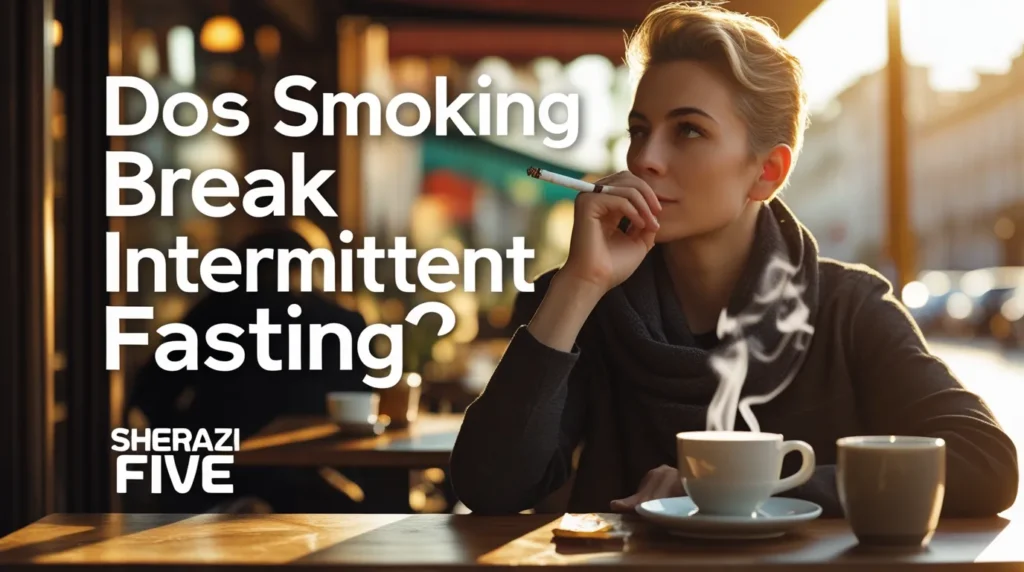
Smoking introduces nicotine and harmful chemicals into the bloodstream. Nicotine increases heart rate, blood sugar, and stress hormones, which may subtly interfere with fasting benefits. While cigarettes contain almost no calories, their hormonal effects can still impact fat burning and metabolism.
Chronic smoking can also reduce cellular repair, weaken the lungs, and stress the liver, which may limit the long-term health advantages of intermittent fasting.
Does Smoking Break Intermittent Fasting?
So, does smoking break intermittent fasting? Technically, smoking doesn’t provide calories. However, nicotine affects insulin and cortisol, which can reduce fat-burning efficiency and autophagy. If your goal is strict fasting, smoking may compromise some of the benefits.
For casual fasters, occasional smoking might not be a major issue. But experts stress that avoiding smoking is the best way to maintain the full benefits of fasting and optimize metabolic health.
Nicotine and Metabolism During Fasting
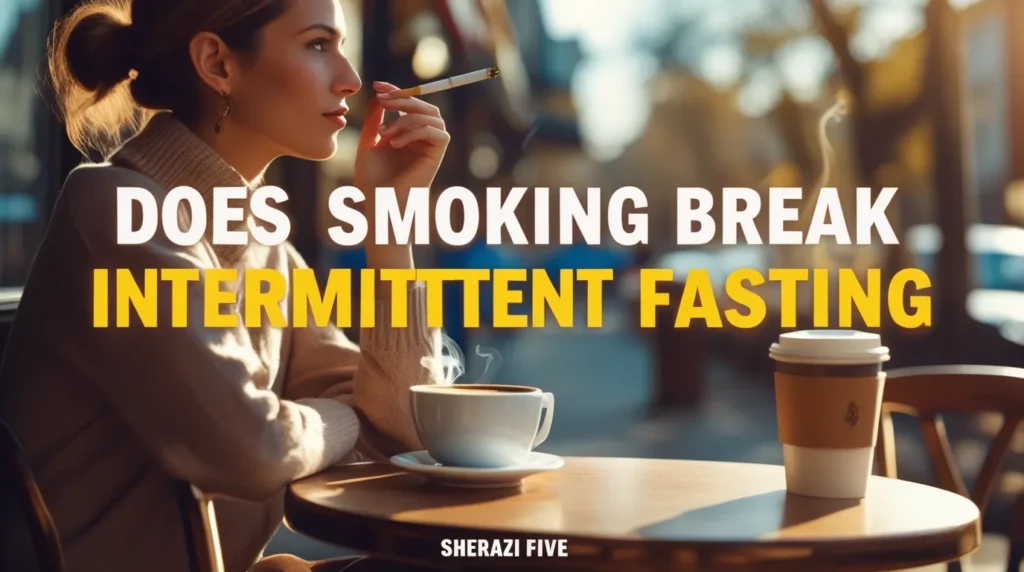
Nicotine can increase metabolism slightly and suppress appetite. While this seems helpful, it also stresses the liver and affects insulin sensitivity. Over time, these effects can interfere with the fat-burning and cellular repair that intermittent fasting provides.
Even if smoking reduces hunger temporarily, your body may not reap the full advantages of fasting. Nicotine impacts blood sugar and hormones, making it less than ideal during fasting windows.
Smoking, Autophagy, and Cellular Repair
Autophagy is a key fasting benefit that removes damaged cells. Smoking introduces toxins that may slow this natural cleaning process, reducing the benefits of your fast.
If your goal is longevity and metabolic health, avoiding nicotine during fasting is essential. Even small amounts of nicotine can stress the liver and interfere with detoxification.
Health Risks of Smoking While Fasting
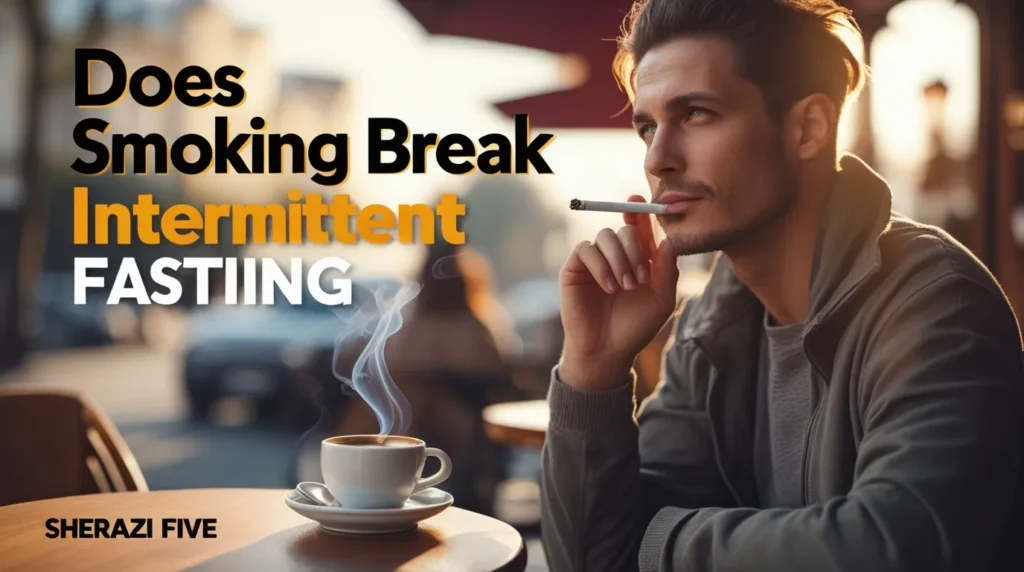
Combining smoking and fasting may increase stress on the heart and liver. Fasting lowers blood sugar, while nicotine temporarily spikes it. This fluctuation can lead to dizziness, headaches, or energy crashes during fasting periods.
Long-term, this combination may worsen cardiovascular health. Even if some fasting benefits remain, smoking reduces the effectiveness of intermittent fasting for weight management and metabolism.
Fasting-Friendly Alternatives to Smoking
If quitting smoking is difficult, try nicotine patches or gums outside fasting windows. Herbal teas, deep breathing, or meditation can help curb cravings without breaking your fast.
Planning your fasting schedule around these alternatives ensures you maintain blood sugar balance and maximize autophagy and fat-burning effects.
Common Myths About Smoking and Fasting
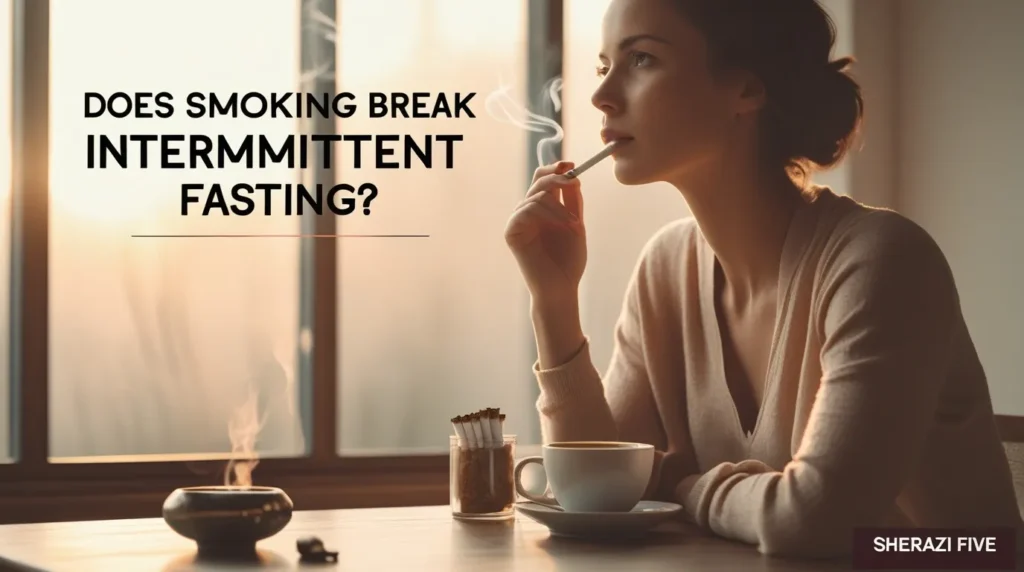
Some believe smoking during fasting enhances fat loss. While nicotine may suppress appetite, it does not amplify fasting benefits and can harm long-term health. Another myth is that it’s harmless because there are no calories, but nicotine’s effect on hormones can subtly reduce fasting efficiency.
Understanding the facts helps you avoid mistakes and maintain optimal health benefits from intermittent fasting.
What Are the 10 Benefits of Drinking Hot Water?
Expert Opinions and Research Findings
Studies show nicotine affects insulin and cortisol, which are critical for fasting benefits. Experts advise avoiding smoking during fasting to protect metabolism, enhance fat-burning, and improve cellular repair.
Doctors recommend focusing on hydration, balanced nutrition, and healthy fasting habits. If nicotine is unavoidable, time its use outside fasting periods for better results.
Final Recommendations
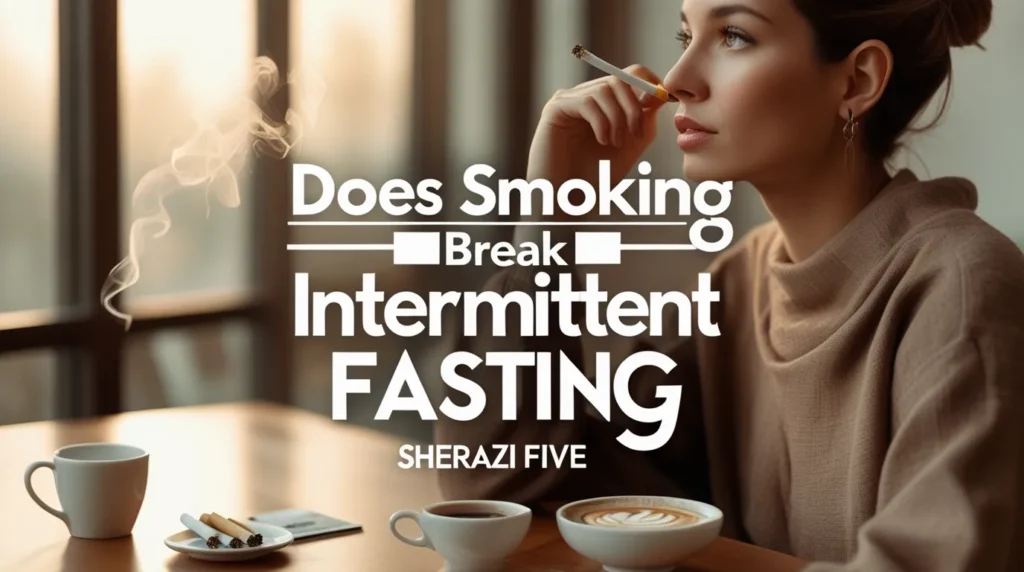
For best results, avoid smoking entirely during intermittent fasting. If quitting isn’t possible, use alternatives like nicotine patches or gums outside fasting windows. Maintaining healthy habits ensures that your fasting benefits, including autophagy, metabolism, and hormone balance, are not compromised.
Always remember, asking “Does Smoking Break Intermittent Fasting?” is a smart step toward understanding how to maximize fasting benefits without harming your health.
Table: Effects of Smoking During Fasting
| Aspect | Effect of Smoking | Impact on Fasting Benefits |
|---|---|---|
| Calories | 0 | Does not technically break fast |
| Insulin & Cortisol | Spikes temporarily | Reduces fat burning and autophagy |
| Appetite | Suppresses | Can reduce hunger temporarily |
| Cellular Repair | Slowed by toxins | Interferes with autophagy |
| Cardiovascular Health | Stressed | Long-term health risk |
FAQs
What happens if you smoke during intermittent fasting?
Smoking introduces nicotine, which can spike insulin and stress hormones, slightly reducing fasting benefits. It doesn’t add calories but may affect fat burning and autophagy.Does nicotine break intermittent fasting?
Nicotine doesn’t contain calories, so it technically doesn’t break a fast, but it can alter insulin and cortisol levels, reducing the full benefits of fasting.Can you smoke during a 12-hour fast?
Technically yes, as it has no calories, but nicotine can affect blood sugar, metabolism, and autophagy, so it may limit fasting results.Do you break fast if you smoke?
Smoking alone doesn’t break a fast calorically, but its impact on hormones and cellular repair may reduce fasting benefits.Why are you not allowed to smoke while fasting?
Smoking can spike insulin and stress hormones and slow autophagy, which defeats some of the health benefits of fasting.Does smoking have calories?
No, cigarettes contain virtually zero calories, but the chemicals still influence metabolism and insulin response.What will ruin intermittent fasting?
Consuming calories, sugary drinks, snacks, or anything that spikes insulin will break your fast; smoking may partially reduce benefits due to nicotine’s effects.How to stop smoking while fasting?
Use nicotine patches or gums, herbal teas, deep breathing, and stay hydrated to reduce cravings during fasting periods.Does nicotine spike insulin?
Yes, nicotine can slightly increase insulin and cortisol levels, which may interfere with fasting benefits.Does smoking break autophagy?
Smoking introduces toxins that can slow cellular repair, partially reducing the autophagy benefits of fasting.Does smoking make you gain weight?
Smoking itself doesn’t directly cause weight gain, but quitting may increase appetite temporarily; chronic nicotine can also affect metabolism and fat distribution.Can you smoke on a 3-day fast?
Smoking may not break the fast calorically, but long-term autophagy and hormone benefits could be reduced during extended fasting.Does Coke Zero break autophagy?
Coke Zero has artificial sweeteners that don’t spike insulin for most people, so it generally doesn’t break autophagy.Does nicotine induce autophagy?
Nicotine does not stimulate autophagy; it may actually interfere with cellular repair during fasting.What is dirty fasting?
Dirty fasting involves consuming small amounts of calories, cream, or flavored drinks during a fast, which can reduce autophagy and fat-burning efficiency.Will lemon water break a fast?
Plain lemon water in small amounts usually does not break a fast as it has minimal calories and won’t spike insulin.What throws you out of autophagy?
Eating calories, sugar, protein, or processed foods spikes insulin, which halts autophagy. Smoking may partially reduce it too.Will I lose belly fat if I quit smoking?
Quitting smoking combined with healthy diet and exercise can help reduce belly fat over time, though initial cravings may increase appetite.How many cigarettes a day is safe?
No amount of smoking is truly safe; even one cigarette per day increases health risks.How long after quitting smoking are you considered a non-smoker?
You are generally considered a non-smoker after 12 months of completely quitting, though lung and cardiovascular improvements continue over years.




